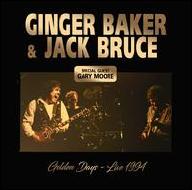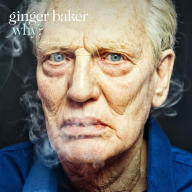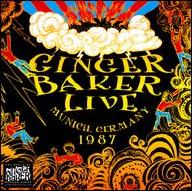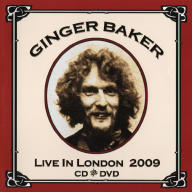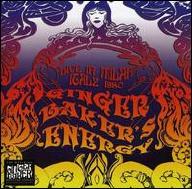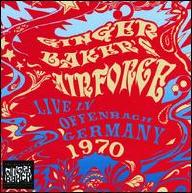He was born Peter Edward Baker in Lewisham, London, in 1939. The nickname "Ginger" came along later, a result of his red hair. As a boy, Baker had a special interest in bicycle racing, but by his mid-teens, his interests had switched to music, especially percussion. A rebel even at that age, he became devoted to modern art and contemporary jazz, transforming himself into something of a beatnik during the mid- to late '50s. A natural musician, he talked himself into his first professional gig when he was 16 and was on the road that year, working full-time. Baker's idol during the late '50s was Phil Seaman, a jazz drummer who was probably the best percussion player in England; his own playing tended toward an aggressiveness and articulation that were unusual in juxtaposition with each other.
By the end of the '50s, Baker had passed through several of what were known in England as trad jazz bands -- "trad" was the English designation given to what Americans and the rest of the world know as Dixieland jazz. It was the dominant form of popular jazz in England from the mid-'50s onward and it provided employment. He'd been a member of Terry Lightfoot's and Acker Bilk's bands, but the fit was an awkward one, owing to the passion that Baker often displayed in his work and his own personally outspoken nature. Instead, he turned toward the budding British blues scene coalescing around the work of Alexis Korner and Cyril Davies -- less bound in tradition and built largely around younger players, this music was growing and being played in a much more open environment.
In 1962, on the recommendation of Charlie Watts, Baker was selected as the latter's replacement in Blues Incorporated, the band started by Korner and Davies. It was here that Baker first crossed paths with two musicians -- saxman and organist Graham Bond and bassist Jack Bruce -- who were to play a key role in his professional career. Their work with Blues Incorporated was successful enough, but it was while the two were playing with a side group, the Johnny Birch Octet, that they began jamming with saxophonist Dick Heckstall-Smith (another Blues Incorporated alumnus) and began getting a very positive response from the crowds. It was out of those jams that Baker, Bond, Bruce, and (joining a little later) Heckstall-Smith formed the Graham Bond Organization in 1963, the former three quitting Korner's group all at once. The Graham Bond Organisation was never as popular as such Blues Incorporated offshoots as the Rolling Stones or the Small Faces, being more jazz-oriented in their approach to R&B, and, thus, a little too complex to find a huge audience, but they were successful and respected on-stage; Baker's reputation among blues aficionados and more scholarly British rock listeners can be traced to his work with the group. Their recordings, however -- with the obvious exception of the Klooks Kleek concert album -- were never as exciting as their live performances.
Its name aside, Ginger Baker was the de facto leader of the Graham Bond Organization. Bond himself was temperamentally unsuited to a leadership role, a condition made worse by the spells of substance abuse and addiction that blighted his life. The Bond group also hooked Baker up in the same rhythm section with Jack Bruce for an extended period of time, and few relationships between constant bandmates -- with the exception of siblings Jimmy and Tommy Dorsey's efforts at working together in the early '30s -- have been so tumultuous and productive. The two genuinely hated each other on a personal level, and stories of each wrecking (or trying to wreck) the other's instruments and attacking each other on-stage abound. Still, the group's sound was extraordinary, a jazz-based R&B built around four powerful players, each displaying varying degrees of virtuosity and assertiveness that was quite daringly complex. And their manager, Robert Stigwood, saw them all as talents worth keeping an eye on in the future.
Baker eventually fired Bruce, who jumped to John Mayall's Bluesbreakers, which, fatefully, allowed him to cross paths with Eric Clapton for a short time, and then to Manfred Mann, as well as doing session work that even had him playing on records by the Hollies. By early 1966, the Graham Bond Organization had run its commercial course (though it was still sufficiently viable to turn up on a poster outside of the club that David Hemmings' character enters in Blow Up), and Baker was searching for a new gig.
He'd observed John Mayall the Bluesbreakers in action and had known lead guitarist Eric Clapton for a couple of years, having jammed with him once in 1964 as part of the Graham Bond Organization, and approached him initially to write together and perhaps form a group. Baker had, in effect, been running the Graham Bond Organization while Clapton had emerged in Mayall's group so far into the spotlight that he'd eclipsed Mayall himself; they discovered that they were in exactly the same place. The great irony was that Clapton, impressed with Bruce's musicianship in both the Bluesbreakers and a short-lived group called Eric Clapton the Powerhouse, insisted that the bassist come aboard as the third member of the trio. Baker agreed, somewhat reluctantly, acknowledging Bruce's daunting musical ability and willing to overlook their past animosities. The proposed trio, christened Cream, was signed up by Reaction Records, a record label founded by Robert Stigwood, who had been the manager of the Graham Bond Organization, knew of Baker's and Bruce's virtuosity intimately, and was equally impressed by Clapton and as eager as any executive in England to get the three together and see what would happen.
What happened initially was "Wrapping Paper," a pop-style single released in late 1966 that didn't impress too many people -- although even there, one could hear a swing element to the group's sound, reminiscent of '40s jazz, that showed off one (albeit minor) component of what went into their sound. Baker was barely audible in the mix, though what one could hear of the drumming did have a signature of sorts, a loose, jazzy element that was unusual. Within the next year, the band would become a chart-topping act and then a cultural phenomenon, however, and at its core was Baker. He and Bruce continued to argue without let-up while Clapton mediated and refereed, and on their records everyone got to shine, but Baker's playing was special even in that context -- on "Rollin' & Tumblin'," a Muddy Waters blues standard that the trio took into the stratosphere from the first note, Baker's playing sounded like it was on another planet, matching Clapton's rapid-fire quoting of the main riff and Bruce's frenzied singing and quietly overpowering the listener; his playing on "I'm So Glad," by contrast, had a lyrical, almost melodic quality, like a veiled orchestral accompaniment to the bass and guitar -- he kept a beat, but his drumming also played the kind of role that a harpsichord continuo played in Baroque music. And then there was "Toad," in its original studio version, an offshoot of several pieces dating back to the Graham Bond days that featured Baker in a solo; here, as on "Oh Baby" from the first Graham Bond album, Baker made his drum kit sing.
In concert, the piece would become the basis for a ten-minute drum solo that was no less impressive. The trio's live sound was, alas, limited somewhat by the technology of the day, especially when they become too popular to play small clubs (which was very early), but Baker set a new standard for playing on record, and at those shows, that every drummer with more than an ounce of ambition sought to emulate. A lot of critics in later years also felt that Baker also had a lot to answer for -- that the 15-minute live version of "Toad," 13 minutes of which was Baker solo, opened the way to gargantuan drum solos by the metal bands that came up after Cream, culminating with the infamous (and extremely funny) drum solo interlude in the movie This Is Spinal Tap. Baker can hardly be faulted, however, for the excesses of those who followed after him -- his studio work with Cream, and at least the live material that was authorized for release, never showed him playing lengthy solos for their own sake but rather depicted a drummer coaxing beautiful voices out of his instrument. The mere fact that he could do it for ten minutes or more at a stretch was impressive, to say the least.
Cream made (and still generates) a huge amount of money, but couldn't last long with the egos involved -- in just over two years, they were history. It turned Baker into a permanent superstar, however. Such was his influence that he was able to turn young admirers of his playing on to older drummers such as Gene Krupa and Buddy Rich, whose careers dated to the '30s and '40s, respectively. For a time at the end of the '60s, teenagers who hadn't even been born when Krupa retired the last of his big bands were seeking out the drummer's work, all based on Baker's professed admiration for him.
What followed next for Baker was Blind Faith, one of the most celebrated still-born bands in history -- many millions of records sold, and millions of dollars earned, despite their having only about an eight-song repertory of their own. Initially planned as a linkup between Clapton and singer/guitarist/keyboard player Steve Winwood, Baker came along and cashed in Clapton's promise to include him in his next project and the resulting business and publicity frenzy pushed the band too far, too quickly. In seven months they were gone, but out of the ashes of Blind Faith rose the group eventually known as Ginger Baker's Air Force. Ironically, Air Force's history was an exact reversal of that of Blind Faith -- initially put together for two live gigs in England, the group suddenly found its life extended to a tour and a second album; in contrast to Blind Faith, however, whose hype had merely reflected an expectant audience eager to see a band made up of two superstars (Clapton and Baker) and one star (Winwood), Air Force's hype was the product of promoters desperately hoping that it would be another Blind Faith.
The group, which included Baker's mentor Phil Seaman and his old bandmate Graham Bond, was much too eclectic ever to have achieved the kind of popularity that Cream or Blind Faith had enjoyed, embracing jazz, traditional African music, blues, folk, and rock. The ten-piece band lasted less than a year before breaking up, leaving behind a genuinely fascinating and exciting live album and an interesting studio LP (both combined on the Ginger Baker double-CD set Do What You Like. In 1971, Baker decided to indulge his longtime fascination with African music first-hand and moved to Nigeria, where he built the first modern recording studio in western Africa. Over the next three years, he worked with a huge range of acts, including Fela and Paul McCartney's Wings, as well as recording the solo album Stratavarious -- he ultimately lost the studio and most of his money (and has claimed that McCartney stiffed him for the use of the studio in the recording of Band on the Run).
During 1974, Baker formed the Baker-Gurvitz Army Band with guitarist Adrian Gurvitz and bassist Paul Gurvitz, which made an initial splash in America before fading out commercially over the next three years. He finally re-emerged in 1986, with bassist/guitarist Bill Laswell on the album Horses Trees. By that time, a new generation of star drummers had emerged, most notably Carl Palmer of Emerson, Lake Palmer and Bill Bruford of Yes and King Crimson, but Baker's reputation, thanks to the continued catalog sales of Cream's work, continued to resonate with fans and casual listeners. Over the next few years, Baker reappeared through various projects, including Ginger Baker's African Force and Middle Passage, that freely mixed African and Western musical influences. And in 1991, Baker surprised onlookers with the release of Unseen Rain, a free-form instrumental album done almost entirely on acoustic instruments. Finally, in 1994, he returned to Atlantic Records -- which had been the U.S. outlet for Cream's recordings -- and to what he realized were his jazz roots with the triumphant Going Back Home, which featured the Ginger Baker Trio. Baker had hooked up with jazz trumpeter Ron Miles on Coward of the County, a hugely successful showcase for his jazz side which also included a tribute to the late Cyril Davies, the British blues enthusiast who co-founded Blues Incorporated in the early '60s.
Baker, like his ex-bandmates, has seen fit since the '70s to keep the legacy of Cream at arm's length or further -- the trio's induction into the Rock & Roll Hall of Fame reportedly did little to change his feelings, and he is also said to be astonished at the emergence of Eric Clapton to mega-stardom during the '90s. Despite some of the financial and other troubles that have dogged him since the '60s, he has been content to go his own way musically for the benefit of any who cares to hear.
He issued two albums with his African Force band in 2001 (ITM) and 2006 (Palanquin's Pole). In 2009, a video and audio document of a live show entitled Ginger Baker Plus Special Friends Live at the Jazz Cafe London was released, followed by director Jay Bulger's documentary Beware of Mr. Baker in 2012: a film in which the subject was an active participant, both confirming and exploding the various myths surrounding his persona. Surprising everyone, Baker signed to Motema Records in 2014. His debut for the label, Why?, was co-produced by drummer Alec Dankworth and Abass Dodoo. His lineup included Pee Wee Ellis on saxophones, Dankworth on drums, and Dodoo on percussion. The album was recorded in January and released in May of 2014. Baker struggled with health issues in the last years of his life, and was forced to cancel a 2016 tour due to cardiac problems. Not long after an announcement from his family that the drummer was gravely ill, Ginger Baker died on October 6, 2019; he was 80 years old. ~ Bruce Eder, Rovi



